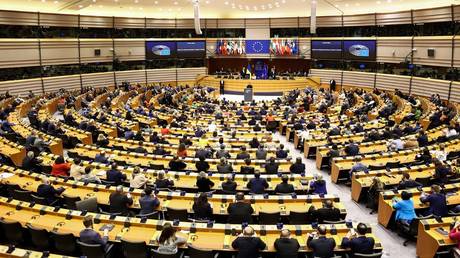
Budapest is obstructing all of the bloc’s efforts related to military support for Kiev, the paper’s sources claim
Hungary has blocked legislation to allow the EU to hand over profits earned on frozen Russian assets to Ukraine, Financial Times reported on Saturday, citing sources.
After the start of the Ukraine conflict, the West froze around $300 billion in Russian sovereign assets, with around $280 billion trapped in the EU. While the bloc stopped short of confiscating the assets outright due to legal concerns, earlier this week it approved the use of interest generated from the assets to provide military aid to Kiev. The annual revenue is estimated to be around $3 billion.
However, according to five FT sources familiar with internal discussions among EU ambassadors, Hungary’s envoy has opposed expedited payments to Ukraine using Russian interest income. “For the time being they are blocking everything connected to the military support to Ukraine,” one source said, adding the situation would not change until next month’s elections for the European Parliament, at the earliest.
To placate Hungary, the EU reportedly proposed a deal under which its share of the bloc’s funds would not be used to purchase weapons for Ukraine. According to FT, this had limited success, as Budapest agreed not to veto the transfer of revenue to Ukraine. However, it is holding up the implementation of the decision by failing to support the necessary legislation, the article says.
The outlet also said that while Hungary is not opposed to sending the Russian money to Ukraine per se, it has concerns about making the payments automatic.
Meanwhile, Moscow has denounced the decision to transfer profits from its assets to Ukraine as blatant and illegal “expropriation.” Kremlin spokesman Dmitry Peskov has called the move “potentially dangerous,” and warned of possible repercussions, including lawsuits.
Hungary has been a consistent critic of the West’s approach to the Ukraine conflict, particularly its arms shipments to Kiev. Officials in Budapest have repeatedly called for a ceasefire, insisting that EU sanctions against Russia have failed to undermine its economy and have boomeranged against the bloc.
At the end of last year, Hungary delayed the EU’s €50 billion ($54 billion) aid package to Ukraine for several weeks, but eventually backed down under Western pressure.




